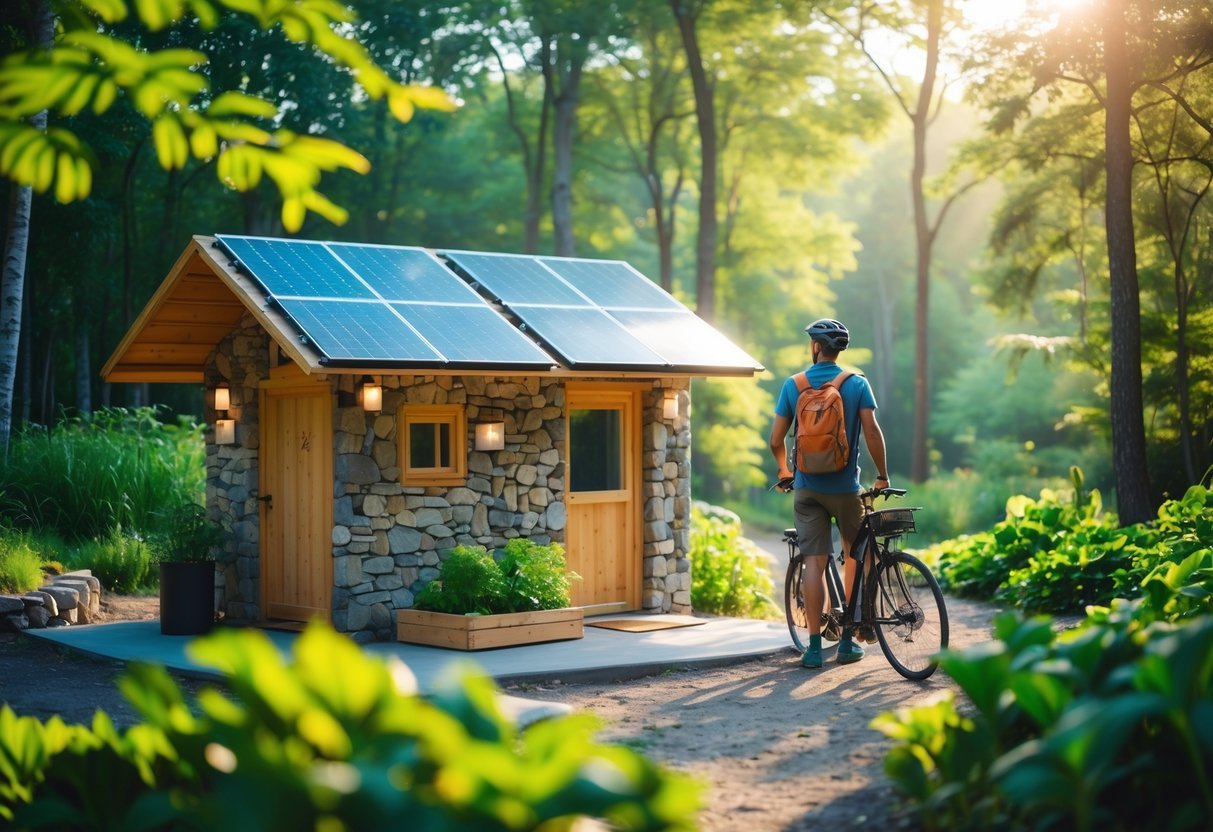Traveling without harming the planet is possible when you choose eco-friendly options. You can reduce your impact by staying in sustainable lodges, cutting down on waste, and supporting local communities. These choices help protect the environment and benefit the places you visit.

By picking hotels that use renewable energy or recycle, you lower your carbon footprint. Minimizing waste means bringing reusable items and avoiding single-use plastics. Supporting local businesses also helps communities thrive without causing harm to their surroundings.
When you plan your trip with care, you enjoy new experiences while keeping nature safe. Traveling this way makes your adventures better for you and better for the world around you.
Choosing Sustainable Lodging

Picking the right place to stay can cut down your travel impact a lot. This means finding spots that save energy, reduce waste, and help the local economy. You should know what certifications to look for, how campgrounds can limit damage, and what green steps hotels take.
Eco-Certified Accommodations
Look for hotels or rentals with eco-certifications like LEED, Green Key, or Green Globe. These labels mean the place meets rules for energy savings, water use, and waste management. You can trust that these lodgings use renewable energy, recycle well, and reduce harmful chemicals.
Many certified places also support local projects or protect natural areas nearby. Choosing certified stays helps you avoid contributing to pollution or habitat destruction. Check the certification details on the lodging’s website before booking.
Low-Impact Campgrounds
Camping can be eco-friendly when done at the right spots. Low-impact campgrounds limit the number of visitors to protect the land. They have clear rules about waste, fire use, and staying on trails to avoid soil and plant damage.
You should bring reusable gear and pack out all your trash. Many of these campgrounds provide compost toilets or recycling bins to cut down on pollution. Staying here also supports conservation efforts by funding park maintenance and wildlife protection.
Green Hotel Practices
Some hotels don’t have certifications but still follow smart eco practices. Look for places that use LED lighting, have water-saving fixtures, and offer linen reuse programs. These steps can cut water and energy use hugely.
Other helpful actions include using local foods in restaurants, avoiding single-use plastics, and offering bike rentals. Green hotels train staff to be energy-conscious and maintain buildings efficiently. You can ask hotels about their efforts before booking to choose the best option.
Minimizing Waste While Traveling

You can cut down waste by choosing the right gear, avoiding single-use plastics, and disposing of trash properly. These steps help keep the places you visit clean and safe.
Reusable Travel Gear
Bring items you can use again and again to avoid trash. For example, use a refillable water bottle instead of buying bottled water. A durable travel mug lets you enjoy drinks without disposable cups.
Pack a set of reusable utensils and a cloth napkin. This helps if you grab takeout or snacks. Consider a travel-sized soap bar or shampoo bar instead of single-use bottles. These cuts waste and often weigh less in your bag.
Make sure your reusable items are easy to clean. That way, you can keep using them no matter where you are.
Packaging and Single-Use Plastic Reduction
Avoid products with lots of packaging, especially plastic. Bring snacks in reusable containers instead of buying pre-packaged ones. When you shop, pick stores that let you refill jars or bags.
Say no to plastic straws and bags. Carry a reusable shopping bag for purchases or carrying items on day trips. Small, foldable bags fit in your pocket or backpack.
Try to buy local goods that use less plastic and packaging. This supports the community and lowers plastic waste from shipping or brand packaging.
Responsible Waste Disposal
Know the trash rules wherever you go. Some places separate recycling, compost, and trash. Follow local guidelines to help waste get handled the right way.
Carry a small trash bag if you hike or visit remote spots. That lets you pack out all your garbage, including food scraps or wrappers.
If you use public bins, avoid overfilling them. If you don’t find a bin, hold your waste until you can dispose of it properly. Leaving trash behind harms the environment and wildlife.
Supporting Local Communities Responsibly

When you travel, your choices can help boost local economies and protect traditions. You can support small business owners, buy thoughtfully, and show respect for different cultures.
Locally-Owned Businesses
Choose shops, cafes, and guides that are run by local people. This puts money directly into the community and helps families earn a fair living. Avoid big chains or franchises, as they often send profits away from the area.
When visiting markets or restaurants, ask about the origin of products and food. Locally sourced items reduce transportation impact and support nearby farmers and artisans. Small businesses also offer unique, authentic experiences you won’t find in large tourist spots.
Ethical Souvenir Shopping
Buy items made by local artisans instead of mass-produced souvenirs. Look for handmade crafts that use sustainable materials. This helps preserve traditional skills and prevents environmental harm.
Avoid products made from endangered animals or cultural artifacts that are not legally sold. If unsure, ask vendors about the story behind the item and its materials. Ethical shopping respects the community and keeps your visit responsible.
Cultural Sensitivity
Learn about local customs and traditions before you go. Simple acts like greeting people properly or dressing modestly show respect and build good relationships.
Don’t take photos without permission, especially in sacred or private places. Be aware of local rules and try to speak a few words in the local language. Respecting culture makes your visit more meaningful and helps preserve local heritage.
Reducing Carbon Footprint on the Move

Traveling can create a lot of carbon emissions, but you can take steps to lower your impact. Choosing the right transport and balancing out your emissions are key ways to do this.
Eco-Friendly Transportation Options
You should pick transportation that uses less fuel or none at all. Trains and buses often produce fewer emissions per passenger than cars or planes. If you fly, try to book direct flights, since takeoffs and landings create the most pollution.
Once at your destination, use bikes or walk when possible. Many cities offer bike rentals or electric scooters that are better for the environment than taxis or ride-hailing cars.
If you rent a car, look for electric or hybrid models. These types use less gas and pollute less than regular cars. Always carpool or share rides to use fewer vehicles.
Offsetting Travel Emissions
When you cannot avoid emissions, you can balance them by supporting green projects. Carbon offset programs let you pay to reduce emissions in other places, such as planting trees or funding clean energy.
Before buying offsets, check if the program is verified by trusted groups. Look for projects certified by organizations like Gold Standard or Verified Carbon Standard to be sure your money truly reduces emissions.
Keep track of your trip’s emissions using online calculators. This helps you know how many offsets you need to buy and how your choices affect the environment.
Conclusion
So, is it really possible to travel and still do right by the planet? Absolutely—if you’re thoughtful about where you stay, how you move, and who you support along the way. It’s not about being perfect but about making better choices, one trip at a time.
Eco-friendly adventures might take a little more effort, but they’re worth it. You get to see the world and leave it just a bit better than you found it. That’s a journey worth taking, don’t you think?





[…] you’re planning a trip, consider eco-friendly travel options. Trains or direct flights are usually better bets if you want to reduce your carbon […]